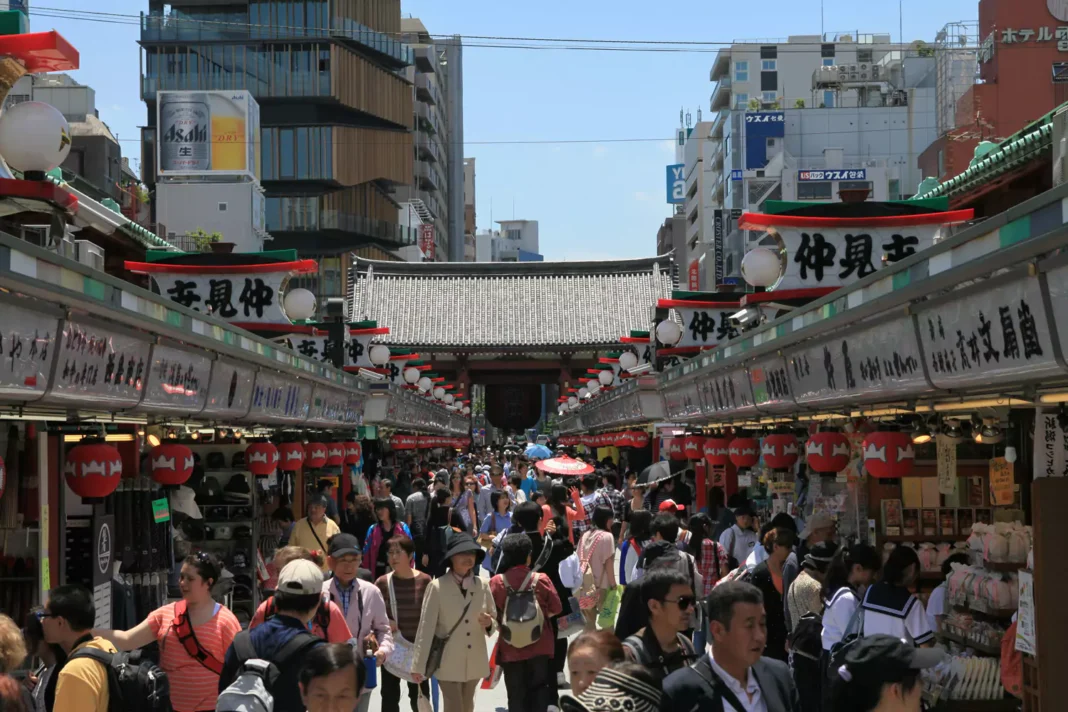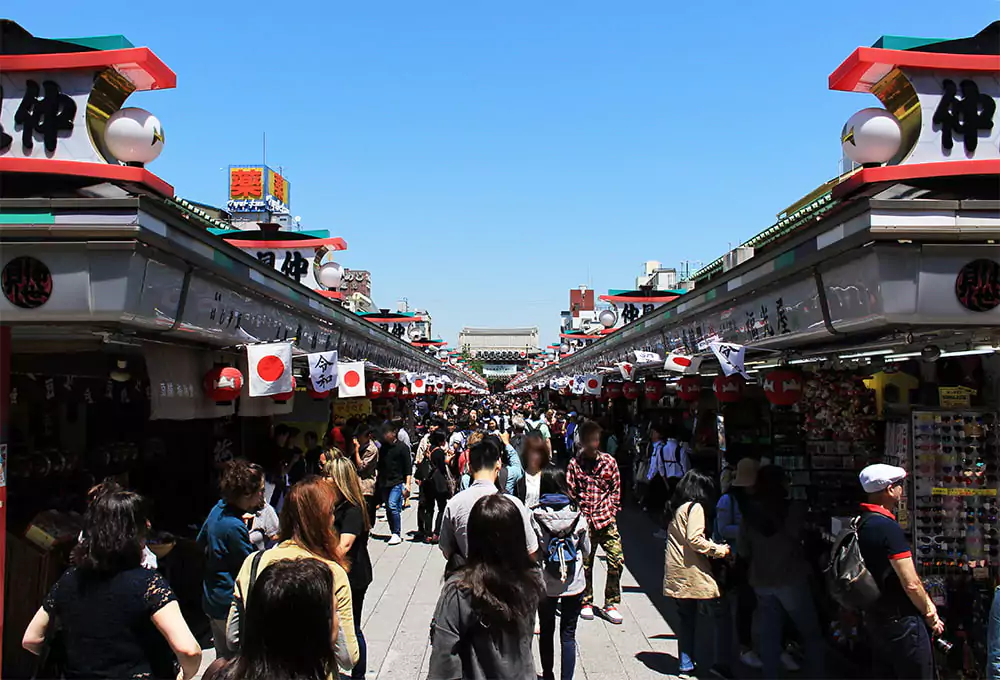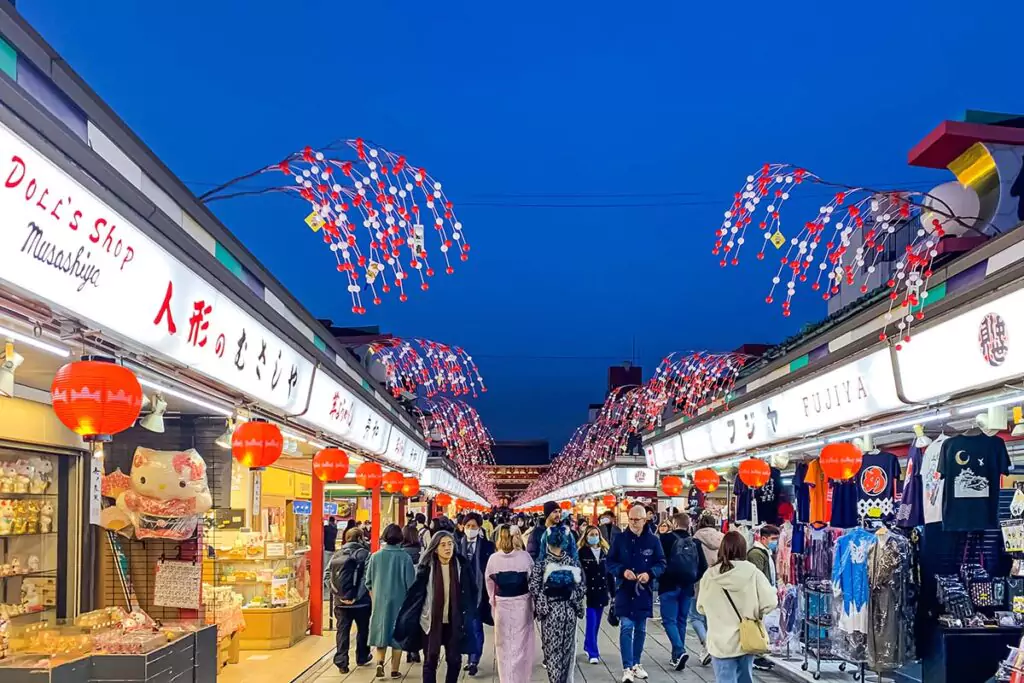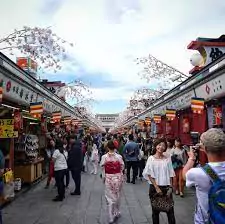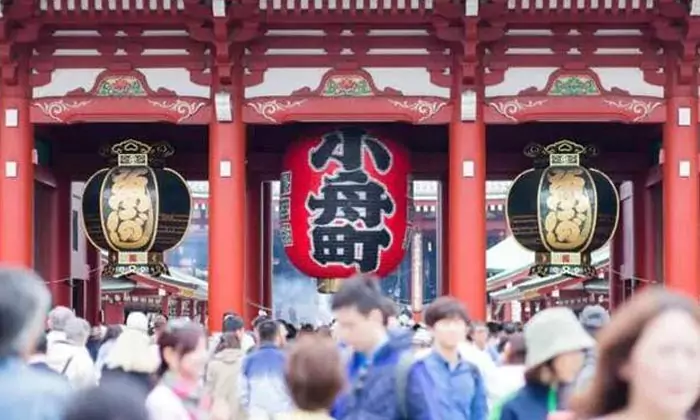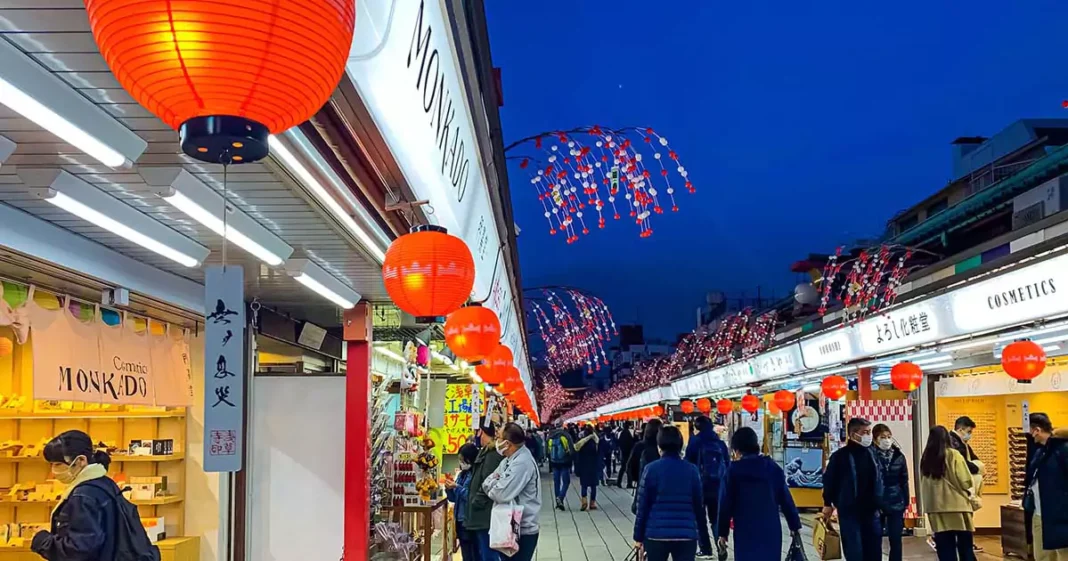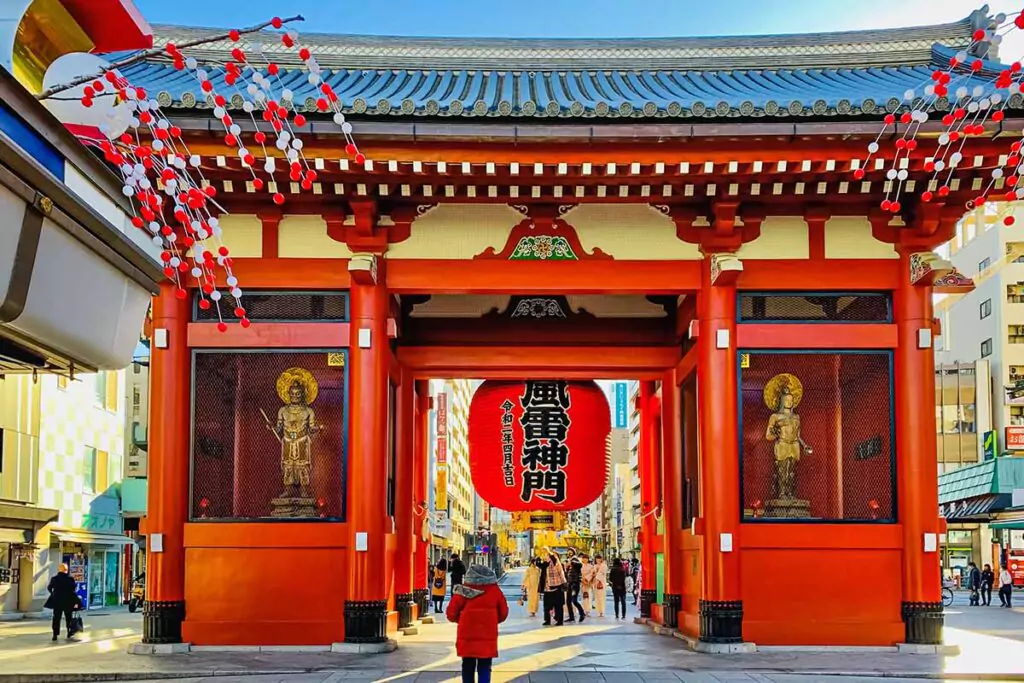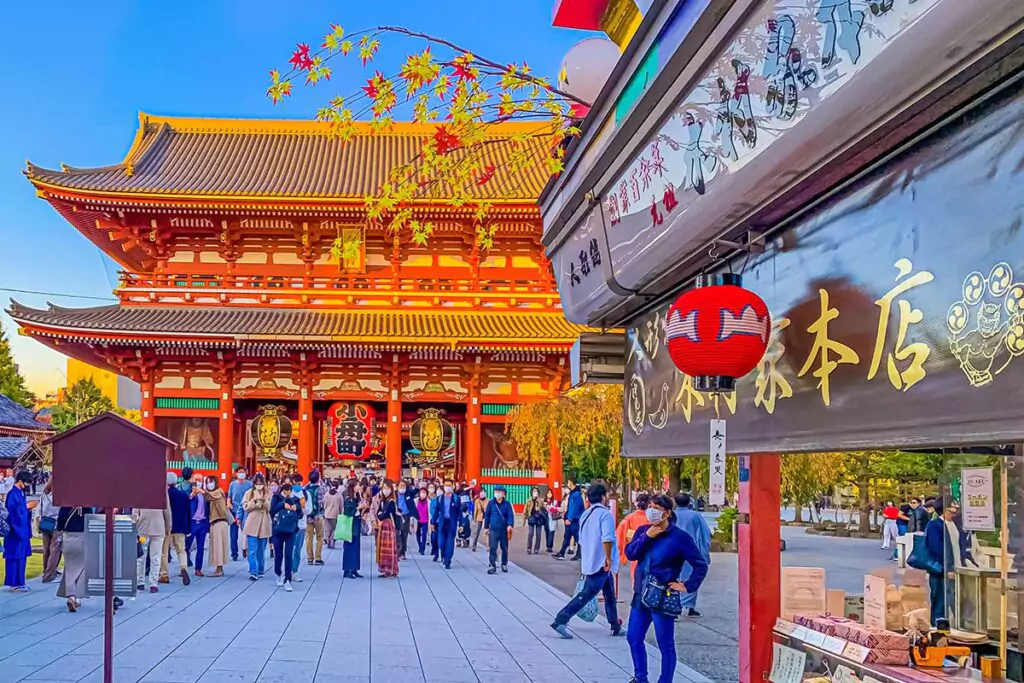Asakusa, a district steeped in history and tradition, offers a captivating glimpse into Tokyo’s cultural soul. With its iconic Senso-ji Temple, vibrant Nakamise-dori Street, and a plethora of authentic Asakusa cultural experiences, this district is a must-visit destination for any traveler seeking to delve into the heart of Japan.
Senso-ji Temple: An Essential Asakusa Cultural Experience
Address: 2-3-1 Asakusa, Taito City, Tokyo 111-0032, Japan Hours: 6:00 AM – 5:00 PM daily Contact: +81 3-3842-0181
Senso-ji Temple, Tokyo’s oldest temple, stands as a testament to the city’s rich spiritual heritage. Founded in 645 AD, this Buddhist temple has witnessed centuries of history and remains a place of deep reverence for locals and visitors alike. Experiencing the serenity of Senso-ji Temple is one of the most profound Asakusa cultural experiences.
As you approach the temple grounds, you’ll be greeted by the imposing Kaminarimon (Thunder Gate), adorned with a massive red lantern and guarded by the fierce deities Fujin (god of wind) and Raijin (god of thunder). Passing through the gate, you’ll enter Nakamise-dori Street, a bustling marketplace leading to the temple’s main hall.
Enhancing Your Cultural Experience at Senso-ji:
- Observe the rituals: Witnessing locals offering prayers and performing rituals provides insight into Japanese Buddhist practices.
- Explore the temple grounds: Discover the five-storied pagoda, Asakusa Shrine, and other historical structures within the temple complex.
- Participate in events: Check the temple’s calendar for special events and festivals throughout the year, offering unique Asakusa cultural experiences.
Nakamise-dori Street: Asakusa Cultural Experiences Through Shopping and Food
Nakamise-dori Street, stretching for approximately 250 meters, is a vibrant thoroughfare connecting Kaminarimon Gate to Senso-ji Temple. This historic marketplace is a treasure trove of traditional Japanese crafts, souvenirs, and local snacks, offering a unique window into Asakusa cultural experiences.
Discovering Cultural Treasures on Nakamise-dori:
- Traditional crafts: Browse shops offering handcrafted items like kimonos, folding fans, and woodblock prints, representing Japanese artistry.
- Local delicacies: Sample traditional sweets like mochi (rice cakes) and ningyo-yaki (small cakes filled with sweet bean paste) for a taste of Japanese culinary culture.
- Souvenir shopping: Find unique souvenirs, from lucky charms to miniature replicas of Senso-ji Temple, to commemorate your Asakusa cultural experience.
Beyond Senso-ji: Expanding Your Asakusa Cultural Experiences
While Senso-ji Temple and Nakamise-dori Street are the main attractions, Asakusa offers a variety of cultural experiences to discover.
Exploring Asakusa’s Cultural Landscape:
- Sumida River: Take a stroll along the Sumida River, enjoying scenic views of the city and observing local life.
- Sumida Park: Visit the Sumida Park, a popular spot for cherry blossom viewing in spring, and experience a cherished Japanese tradition.
- Rickshaw rides: Enjoy a traditional rickshaw ride for a unique perspective of Asakusa and learn about its history from knowledgeable guides.
Nearby Cultural Attractions:
- Tokyo Skytree: The tallest structure in Japan, offering panoramic views of the city and a modern architectural marvel.
- Edo-Tokyo Museum: Immerse yourself in the history of Tokyo, from its Edo period origins to the modern metropolis, at this fascinating museum.
- Asakusa Hanayashiki: Experience Japan’s oldest amusement park, with traditional rides and games, for a glimpse into the country’s entertainment culture.
Practical Tips for Your Asakusa Adventure
Transportation:
- By train: Asakusa Station is served by the Ginza Line, Asakusa Line, and Tobu Skytree Line.
- By bus: Several bus routes connect Asakusa to other parts of Tokyo.
- By boat: Take a scenic cruise on the Sumida River for a unique perspective of the city.
Currency Exchange:
- Many banks and currency exchange shops are located in Asakusa.
- ATMs are widely available.
Cultural Etiquette:
- Bowing: Bowing is a common form of greeting and showing respect in Japanese culture.
- Shoes: Remove your shoes before entering temples and some traditional restaurants.
- Chopsticks: Avoid sticking chopsticks vertically into rice, as this is considered bad luck in Japanese culture.
Real-Life Asakusa Cultural Experiences
Many travelers have shared their unforgettable cultural experiences in Asakusa. One visitor recounted their early morning visit to Senso-ji Temple, witnessing the serene atmosphere and the dedication of the monks performing their rituals. Another traveler shared their delight in discovering unique crafts and souvenirs on Nakamise-dori Street, finding the perfect gifts for friends and family and experiencing the vibrant marketplace culture.
Embrace the Cultural Richness of Asakusa
Asakusa offers a captivating blend of history, spirituality, and vibrant street life. By exploring its iconic landmarks, hidden gems, and engaging in authentic experiences, you’ll gain a deeper appreciation for Japanese culture and create lasting memories of your journey through Tokyo’s cultural heart.
Essential Japanese Phrases for Travelers in Asakusa
Greetings
- Good morning: Ohayo gozaimasu (おはようございます)
- Good afternoon: Konnichiwa (こんにちは)
- Good evening: Konbanwa (こんばんは)
- Thank you: Arigato gozaimasu (ありがとうございます)
- You’re welcome: Do itashimashite (どういたしまして)
- Excuse me: Sumimasen (すみません)
- I’m sorry: Gomen nasai (ごめんなさい)
Directions
- Where is [place]?: [Place] wa doko desu ka? ([Place]はどこですか?)
- To the right: Migi e (右へ)
- To the left: Hidari e (左へ)
- Straight ahead: Massugu (まっすぐ)
- Near: Chikai desu (近いです)
- Far: Toi desu (遠いです)
Dining
- I would like to order: Chumon o onegai shimasu (注文をお願いします)
- Delicious: Oishii desu (美味しいです)
- Water, please: Ohiya o kudasai (お水をください)
- Check, please: Okaikei o kudasai (お会計をお願いします)
Shopping
- How much is this?: Kore wa ikura desu ka? (これはいくらですか?)
- That’s expensive: Takai desu ne (高いですね)
- I’ll take it: Kore o kudasai (これをください)
Emergencies
- Help!: Tasukete! (助けて!)
- I need a doctor: Isha o yonde kudasai (医者を呼んでください)
- Police: Keisatsu (警察)
Additional Tips:
- Download a translation app: This can be helpful for communicating in situations where you don’t know the Japanese phrase.
- Learn a few basic Japanese phrases: Even a few simple phrases can go a long way in showing respect and appreciation for the local culture.
- Be polite and respectful: Japanese culture values politeness and respect, so be mindful of your behavior and interactions with locals.
- Embrace the experience: Asakusa is a unique and fascinating district, so relax and enjoy your time exploring its cultural treasures.


